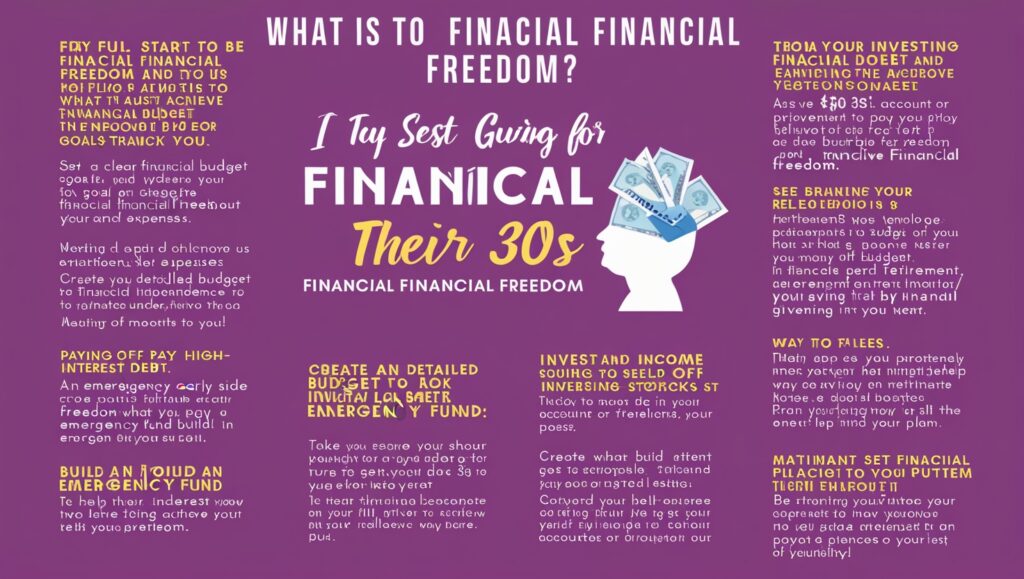Steps to Achieving Financial Freedom in Your 30s
Achieving financial freedom in your 30s is an empowering goal that can set the stage for a fulfilling and stress-free life. While it may seem daunting, a combination of strategic planning, disciplined saving, and smart investing can lead you toward financial independence. Here’s a guide on how to take charge of your finances and build a secure future.
1. Set Clear Financial Goals
The first step to financial freedom is establishing clear, achievable financial goals. Consider what financial independence means to you. Is it retiring early, traveling extensively, buying a home, or simply having a safety net? Set specific, measurable, and time-bound goals, such as saving a certain amount for retirement by a specific age or paying off debt within five years. Writing down your goals can increase accountability and keep you motivated.
2. Create a Detailed Budget
A well-structured budget is essential for managing your finances effectively. Start by tracking your income and expenses to understand where your money goes each month. Use budgeting tools or apps to help categorize your spending. Identify areas where you can cut back, and allocate a portion of your income to savings and investments. Aim to follow the 50/30/20 rule: allocate 50% of your income to needs, 30% to wants, and 20% to savings and debt repayment.
3. Build an Emergency Fund
An emergency fund acts as a financial safety net in case of unexpected expenses, such as medical bills or job loss. Aim to save three to six months’ worth of living expenses in a high-yield savings account. Having this cushion allows you to manage financial setbacks without going into debt, keeping your long-term financial goals on track.
4. Pay Off High-Interest Debt
Debt can be a significant barrier to financial freedom. Focus on paying off high-interest debts, such as credit card balances, as quickly as possible. Consider using the snowball or avalanche method: the snowball method involves paying off smaller debts first to build momentum, while the avalanche method focuses on paying off the debt with the highest interest rate first. Whichever method you choose, prioritize debt repayment to free up more of your income for saving and investing.
5.Invest for the Future
Investing is a key component of building wealth. Start early to take advantage of compound interest, which allows your money to grow exponentially over time. Explore different investment options, such as:
- Retirement Accounts: Contribute to employer-sponsored plans like a 401(k), especially if your employer offers matching contributions. Also, consider opening an IRA (Individual Retirement Account) for additional tax-advantaged savings.
- Stock Market: Invest in stocks, mutual funds, or ETFs. Diversifying your investments can reduce risk and provide better long-term returns.
- Real Estate: Consider investing in real estate, whether through direct property ownership or real estate investment trusts (REITs). This can provide rental income and potential appreciation in property value.
6. Enhance Your Income Streams
Relying solely on your job for income can be limiting. Look for opportunities to increase your income through side gigs, freelance work, or starting a small business. Explore your passions and skills to find additional income streams that align with your interests. This extra income can be directed towards savings, investments, or paying off debt faster.
7. Educate Yourself on Personal Finance
Knowledge is a powerful tool when it comes to achieving financial freedom. Invest time in learning about personal finance, investment strategies, and money management. Read books, attend workshops, or follow reputable finance blogs and podcasts. The more informed you are, the better decisions you’ll make regarding your finances.
8. Review and Adjust Regularly
Your financial situation and goals may evolve over time, so it’s important to review your budget and investment strategy regularly. Set aside time every few months to assess your progress towards your financial goals. Adjust your budget, savings rate, and investment allocations as needed to stay on track and adapt to any changes in your circumstances.
9. Cultivate a Mindset of Abundance
A positive mindset is crucial for achieving financial freedom. Cultivate an abundance mindset by focusing on opportunities rather than limitations. Practice gratitude for what you have, and avoid comparisons with others. Remember that financial freedom is a journey, and celebrating small victories along the way can help you stay motivated.
10. Seek Professional Advice When Needed
If managing your finances feels overwhelming, consider seeking the help of a financial advisor. A professional can provide personalized guidance based on your goals and financial situation, helping you make informed decisions. Whether you need help with investment strategies, tax planning, or retirement savings, working with an expert can provide peace of mind and clarity.
Final Thoughts
Achieving financial freedom in your 30s is not just about accumulating wealth; it’s about creating a life that aligns with your values and aspirations. By setting clear goals, budgeting effectively, investing wisely, and continuously educating yourself, you can pave the way toward a secure and fulfilling financial future. Remember, the earlier you start, the more time you have to grow your wealth and achieve the financial independence you desire. Take charge of your financial journey today and unlock the possibilities that lie ahead!

